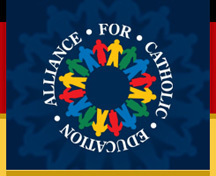
The Alliance for Catholic Education (ACE) program at the University of Notre Dame is aligning with one of the nations most influential foundations on teaching excellence for a conference this month billed asa national conversation on Catholic education.
Cohosted by ACE and the Carnegie Foundation for the Advancement of Teaching, the conference is the first of a series of events that will assemble 45 deans, administrators and faculty from Catholic and secular education programs who share the common conviction that Catholic school teaching should be a specific field. Representatives from philanthropic organizations also will attend.
Carnegie Foundation Chair Lee Shulmans keynote speech is to address that very topic:What is a field, and why is it important to develop a robust field of Catholic education?The conference takes place in Palo Alto, Calif., on Friday and Saturday (Sept. 27 and 28).
The two-day discussion will focus on how to build a momentum and strengthen the field of Catholic education, according to John Staud, ACE director. Central to the question is determining what higher education can do to benefit Catholic schools.
The education field has long been established as a secular field; even Catholic colleges and universities tend to follow the prescribed curricula for teacher preparation. Catholic schoolteachers have the additional mission of faith formation, and the ideal of community is deeply engrained in the religion, Staud explains. Besides determining how to professionalize these ideals, a specific field of education also would address delivering and measuring instructional issues.
Staud also said conference participants will explore how Catholic schools, which frequently struggle to attract resources and receive little public funding, can garner the resources to support program excellence.
These issues will be examined in subsequent conferences. One on formation for teachers and leaders will take place at Loyola University in Chicago; a second, enhancing scholarship and academic quality, is to be hosted by Boston College. Notre Dame will host the third, on stewardship and acquiring resources.
The partnership with Carnegie is significant and helpful, given the foundations commitment to instructional excellence on multiple fronts, including grade and high school, medical school, and seminary instruction. Staud added that non-Catholic educators acknowledge that Catholic schools have and continue to make important societal and cultural contributions.
This is a broader concern than just sectarian,he said.
Since the inception of ACE 14 years ago, Notre Dame has signaled a determination to bolster the teaching ranks of Catholic schools, particularly impoverished ones. Step by step, the ACE program has grown to include a masters degree program in leadership, an English as a New Language certificate program, a Catholic education publishing arm, and in-school support programs that provide onsite instructional and leadership coaching, and sociological research on best practices.
In 1999, ACE and Notre Dame were instrumental in bringing together colleges and universities interested in starting or strengthening teacher service programs like ACE. That group founded the University Consortium for Catholic Education, whose 15 participants place more than 400 teachers a year in under-resourced Catholic and parochial schools across the country.
The upcoming conferences also will build on a major report on the future of Catholic education presented last year to the United States Conference of Catholic Bishops. Its recommendations were forged by a committee organized by Notre Dames president, Rev. John I. Jenkins, C.S.C., and guided by ACE founder Rev. Timothy Scully, C.S.C.
TopicID: 24627